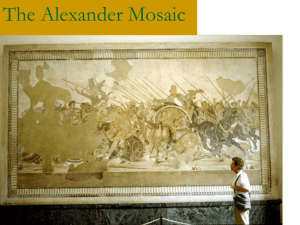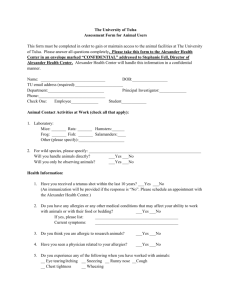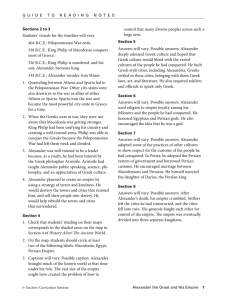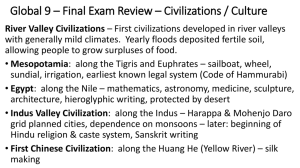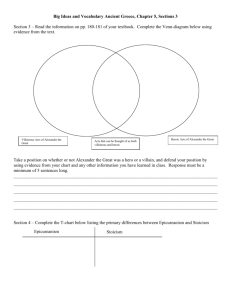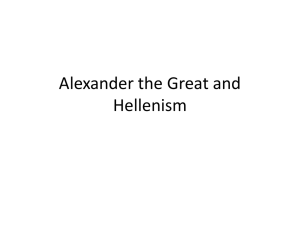Alexander the Great - Ch 3 PPt
advertisement
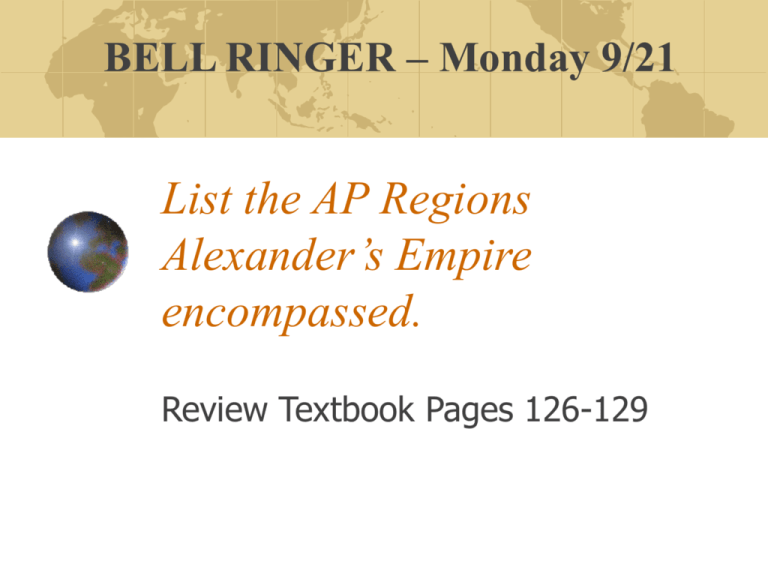
BELL RINGER – Monday 9/21 List the AP Regions Alexander’s Empire encompassed. Review Textbook Pages 126-129 Alexander the Great https://www.youtube.com/watch?v=0LsrkWDCvxg (Crash Course on Alexander the Great) Why “the Great”? In ten years, Alexander of Macedonia created the largest empire in the world up to that time Alexander spread Greek culture, ensuring cultural diffusion and the survival of the qualities of classical Greece Alexander’s Empire Hellenistic Empire (Reading Guide) Alexander’s origins Born in Pella, Macedonia Tutored by the Greek philosopher, Aristotle His father, Philip, was king of Macedonia, and had conquered many Greek city states during his 27 year reign Olympia Alexander’s mother Philip Alexander’s father Alexander Rules Philip was murdered in 336 B.C.E. by an assassin…maybe hired by his wife, Olympia… Alexander was only 20 when he became king of Macedonia Securing his father’s empire Alexander squelched rebellions in the northern regions to the Danube River In the process of reconquering the Greek city states His forces destroyed Thebes, slaughtering 6,000 plus people Another 30,000 women and children were enslaved Mosaic from Pompeii Expanding the Empire Alexander’s forces(Macedonian) of over 40,000 crossed at the Dardanelles strait into Asia, where he declared that the whole of Asia would be won by the spear Development of trained Greek hoplite armies New Military tactics: Cavalry and Phalanx The Gordian Knot The Gordian Knot: the legend behind the ancient knot was that the man who could untie it was destined to rule the entire world. Alexander simply slashed the knot with his sword and unraveled it. Major cities in Asia Minor and along the Phoenician coast surrendered to Alexander Alexander proceeded to Egypt, where he established the city of Alexandria and was made pharaoh Alexander’s divinity While in Egypt, Alexander had visited the temple of Amon-Ra The oracle proclaimed that Alexander was the divine son of Amon-Ra and destined to rule the world Conflicts arose with his Greek soldiers as he adopted Persian dress & demanded to be recognized as a god Defeating Darius of Persia Alexander’s forced dispatched the Persian army, losing only 110 men (legend) Again Alexander was victorious, and Darius was forced to flee, abandoning is mother, wife and children to Alexander According to Aristotle: the Persians were “barbarians, fit only to be slaves” Persian Empire too large to maintain causing administrative (satraps)weaknesses and lack of loyalty to Darius The Barbarians – Why? EUNUCHS- castrated males who were in charge of the concubines of royal harems, served in the daily life of the court, and sometimes carried out administrative functions. THE ACHAEMENID EMPIRE valued eunuchs According to Herodotus (8.105), the Persians, like other Oriental peoples, valued eunuchs highly for their trustworthiness. Ctesias and Xenophon date the appearance of eunuchs in Persia to the time of Cyrus the Great. It is possible that the Persians adopted the practice of castration from the Babylonians or Assyrians (Cook, p. 136; cf. also Meier, pp. 4 As part of their tribute, the Babylonians annually sent five hundred boys to the court of the Persian king to be made eunuchs (Herodotus 3.92). The five boys sent every third year by the Ethiopians and the hundred boys sent every five years by the Colchians and their neighbors probably were also made eunuchs (Herodotus 3.97). In 494 B.C.E., when a revolt of Ionian cities had been crushed, the Persians castrated the best-looking boys (Herodotus 6.9, 32). 85-86). #5: Yet again, Alexander’s forces defeated Darius, this time in Mesopotamia (cities of Susa, Babylon, and Persepolis) Alexander was proclaimed king of Persia and Darius’s royal city and palace were burned to the ground… Barbaric Act by the Greeks Persepolis Again, Darius fled… Alexander pursued… When Darius was found murdered by his own men, Alexander executed the assassins and gave Darius a royal funeral Ruins of Persepolis The limits of expansion In the spring of 327 BC, Alexander and his army marched into India As he conquered regions he allowed rulers to continue to govern in his name Bucephalus In India, Alexander’s horse was killed… He mourned his loss and named a city in his honor Alexander on his favorite horse, Bucephalus 'O my son, look thee out a kingdom equal to and worthy of thyself, for Macedonia is too little for thee.' Philip to Alexander (Plutarch, Alexander 6.8.) Alexander the Great’s Empire Retreat At the Indus, the Macedonians rebelled and refused to go any farther The forces travelled down the Indus and began the arduous journey back to Mesopotamia His best friend, Hephaestion, died of a fever; to console himself, Alexander led a ferocious military campaign and went on a drinking binge Securing a legacy Alexander made Babylonia the capital of his Empire He married one of Darius’ daughters and “encouraged” 10,000 of his soldiers to take Persian wives He died the following year at 33 before he could produce an heir and his kingdom was divided among 3 of his generals The mystery of Alexander’s death Alexander died of a fever at 33… but why? Plutarch reports that he had been plagued by several bad “omens” Some others from the time claimed Alexander was poisoned during the drinking binge ALEXANDER AND HIS SUCCESSORS After Alexander’s death, competition for empire Divided by generals Antigonus: Greece and Macedon Ptolemy: Egypt Seleucus: Persian Achaemenid Empire Economic integration, Intellectual cross-fertilization Antigonus Seleucus Ptolemy Hellenistic Empires Antigonid (Greece and Macedonia) Smallest of Hellenistic Empires Local dissent Issue of land distribution • Heavy colonizing activity Ptolemaic (Egypt) Wealthiest of the Hellenistic empires Established state monopolies • Textiles, Salt, Beer Capital: Alexandria • Important port city • Major museum, library • Multi-ethnic population • Monuments Seleucid (Persia) Massive colonization of Greeks Export of Greek culture, values as far east as India • Bactria • Ashoka legislates in Greek and Aramaic The Economy of the Hellenistic World A Hellenistic City in Asia Hellenistic Philosophers Cynics Diogenes ignore social conventions & avoid luxuries. citizens of the world. live a humble, simple life. Epicurians Epicurus avoid pain & seek pleasure. all excess leads to pain! politics should be avoided. Hellenistic Philosophers Stoics Zeno nature is the expansion of divine will. concept of natural law. get involved in politics, not for personal gain, but to perform virtuous acts for the good of all. true happiness is found in great achievements. Hellenism: The Arts & Sciences Scientists / Mathematicians: Aristarchus heliocentric theory. Euclid geometry Archimedes pulley Hellenistic Art: More realistic; less ideal than Hellenic art. Showed individual emotions, wrinkles, and age! Wrap-up Question -Monday 9/21 Short Essay Response Explain the long-term social, economic, and political effects of Alexander the Great’s empire building? *Review Notes and Textbook Pages 126-129

